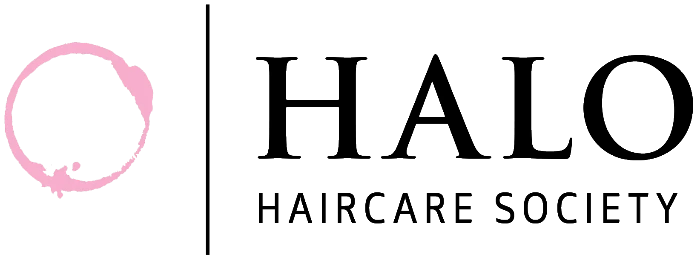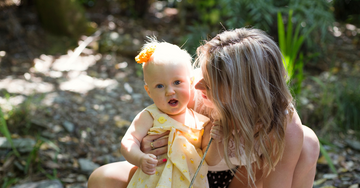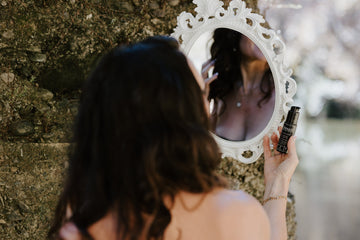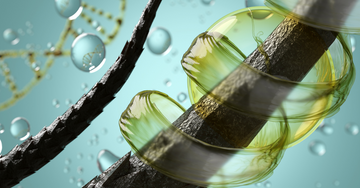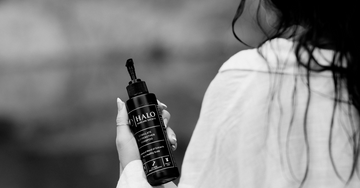Mums Hair Guide - Understanding Postpartum Shedding
Bringing a new life into the world is a beautiful experience, but I'm here to be honest it comes with challenges. One common complaint many new mothers face is postpartum hair loss. If you're noticing less hair on your head and more hair in your brush or on your pillow, you're not alone. Let into me guide you through the different stages of hair health and hair loss and explore practical tips to care for your hair and scalp during this phase.
The Hormonal Roller Coaster
During pregnancy, your body undergoes significant hormonal changes. Elevated levels of estrogen prolong the anagen phase (growth phase) of the hair cycle, resulting in thicker, fuller hair. However, once you give birth, estrogen levels drop dramatically, causing more hair follicles to enter the telogen phase (resting phase) simultaneously. This sudden shift leads to noticeable shedding, typically peaking around three to four months postpartum.
Understanding the Hair Growth Cycle
To fully grasp why postpartum hair loss occurs, it's essential to understand the hair growth cycle, which consists of three phases:
- Anagen Phase: The active growth phase where hair follicles are producing new hair. This phase can last from two to eight years.
- Catagen Phase: A brief transitional phase lasting about two weeks, during which hair growth slows, and separates from the blood supply.
- Telogen Phase: The resting phase where hair does not grow, but remains intact. This phase lasts around three months.
- Exogen Phase: The hair falls by a new hair pushing the old hair out. The new hair is now in the anagen (growth phase)
During pregnancy, an extended anagen phase means less hair shedding. Postpartum, many hairs enter the telogen phase simultaneously, leading to increased shedding.
The Stress Factor
Childbirth is a physically and emotionally stressful event, which can contribute to hair loss. Stress triggers the release of cortisol, a hormone that can disrupt the hair growth cycle, pushing more hair into the telogen phase. Additionally, the demands of caring for a newborn, lack of sleep, and adjusting to a new routine can all exacerbate stress levels.
Tips for Managing Postpartum Hair Loss
While postpartum hair loss is entirely normal and usually resolves on its own, there are steps you can take to care for your scalp and hair, promoting a healthier regrowth process.
-
Scalp Care with Oil Pre-Treatment: Regular scalp massages with our Nourished By Oil can improve blood circulation and stimulate hair follicles. Warm the oil slightly and massage it into your scalp for about 10-15 minutes before shampooing. This pre-treatment can help nourish your scalp and hair, making it healthier and more resilient.
-
Incorporate Growth Serums and Plant-Based Shampoos: Apply Revitalise serum, to promote hair growth and strengthen existing hair. Additionally, choose shampoos with plant-based vasodilators, such as rosemary or peppermint oil. These ingredients increase blood flow to the scalp, potentially extending the anagen phase and encouraging new hair to enter the growth phase quickly.
-
Avoid Tight Hairstyles: The "mum bun" might be convenient, but tight hairstyles can pull on your hair, leading to further breakage and loss. Opt for loose styles that don't strain your hair and scalp.
-
Silk at Night: Swap your cotton pillowcase for a silk one to reduce friction and minimize hair breakage while you sleep. Silk is gentler on your hair, helping to preserve its strength and shine.
-
Healthy Diet and Hydration: A balanced diet rich in vitamins and minerals, especially iron, zinc, and vitamins A, C, and E, can support healthy hair growth. Stay hydrated by drinking plenty of water, as proper hydration is crucial for maintaining healthy hair and scalp.
-
Be Patient: Remember that postpartum hair loss is temporary. Your hair growth cycle will eventually return to its normal pattern. In the meantime, be gentle with your hair and give it the care it needs.
Continuous Pregnancy and Its Impact on the Hair Growth Cycle
For moms who experience back-to-back pregnancies, the hair growth cycle can face additional challenges. Continuous pregnancies mean prolonged periods of elevated estrogen levels, keeping more hair in the anagen phase for extended durations. While this might seem beneficial initially, the cumulative effect can lead to significant shedding once hormone levels finally drop postpartum. This extended cycle can cause a more noticeable and prolonged period of hair loss, as the hair follicles struggle to synchronize and return to a regular growth pattern. It's essential for mothers undergoing continuous pregnancies to be particularly vigilant about scalp and hair care, ensuring they support their hair's health through each pregnancy and postpartum period with nourishing treatments, gentle handling, and a stress-minimizing routine.
When to Start Your Scalp and Hair Routine
The best time to start a scalp and hair routine is as early as possible, ideally during pregnancy. Initiating a hair care regimen early helps to strengthen and prepare your hair for the hormonal fluctuations that occur both during and after pregnancy. By nurturing your scalp and hair from the start, you can mitigate the severity of postpartum hair loss and promote healthier regrowth. Establishing a routine that includes gentle scalp massages, nourishing oils, and plant-based products can create a robust foundation, making your hair more resilient to the stresses of pregnancy and childbirth. However, if you didn't start a routine during pregnancy, it's never too late. Postpartum is also a crucial time to focus on hair and scalp health, addressing any issues as they arise and supporting the natural recovery process. Whether you begin during pregnancy or after, consistency and care are key to maintaining and improving your hair's health.
My Personal Journey: From Hair Loss to Creating a Plant-Based Haircare System
I've always had fine, low-density hair, so when I became pregnant, I decided to let my blonde color grow out and focus on keeping my hair in the best condition possible. However, my pregnancy journey was completely smooth. I developed an extreme case of gestational diabetes, which severely restricted my diet due to an abnormal sensitivity to sugar. I couldn't eat any fruits, sugar or carbohydrates and was on both metformin and insulin dependent. The stress of feeling like I couldn't adequately care for my child before she was even born was overwhelming along with testing my blood sugars 2 hourly and injecting insulin into my stomach, I already felt like I'd failed ''Thanks hormones and hello hair loss". All my nutrients were going to the baby, and unlike many expectant mothers, I didn't experience the luscious locks often associated with pregnancy.
To make matters worse, we moved to a rural property just before my daughter was born. My hair was now exposed to hard water and a swimming pool, which further deteriorated its health. Then, postpartum hair loss hit. As a hairdresser, I thought I had all the knowledge I needed to care for my scalp and hair, but nothing seemed to restore my hair's health. When my second pregnancy brought back gestational diabetes, even worse than the first time, my hair suffered even more. Two back-to-back pregnancies left my hair broken, thinning, and far from returning to its normal growth phase.
Determined to find a solution, I began extensive research and created Halo, a plant-based haircare system that transformed my hair. By using plant-based vasodilators, scalp oils, and regular massages, I saw a significant improvement. I also ditched silicones and sulfates and started a layering method to use products correctly according to their molecular weight, protecting my hair from all external elements. Finally, I saw a difference in my hair, and my journey inspired me to help other moms going through similar struggles. Halo was born out of my own challenges, and it continues to help others regain their hair health and confidence.
You're not alone, women are amazing.
Postpartum hair loss can be a frustrating experience, but all new mums will experience hair loss, understanding the underlying causes and taking proactive steps can help you manage it more effectively. By caring for your scalp, using growth-promoting products, and adopting gentle hair care practices, you can navigate this phase with confidence. Remember, you're not alone, us women and our bodies are pretty amazing, your hair will regain its strength and vitality over time. Embrace motherhood, and give yourself grace as you adjust to your new role.
